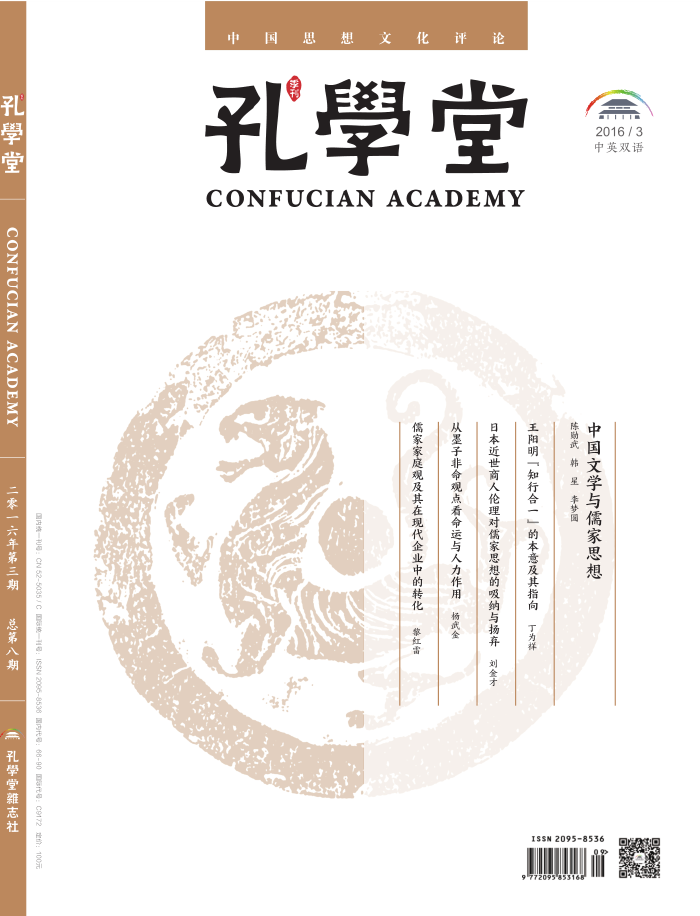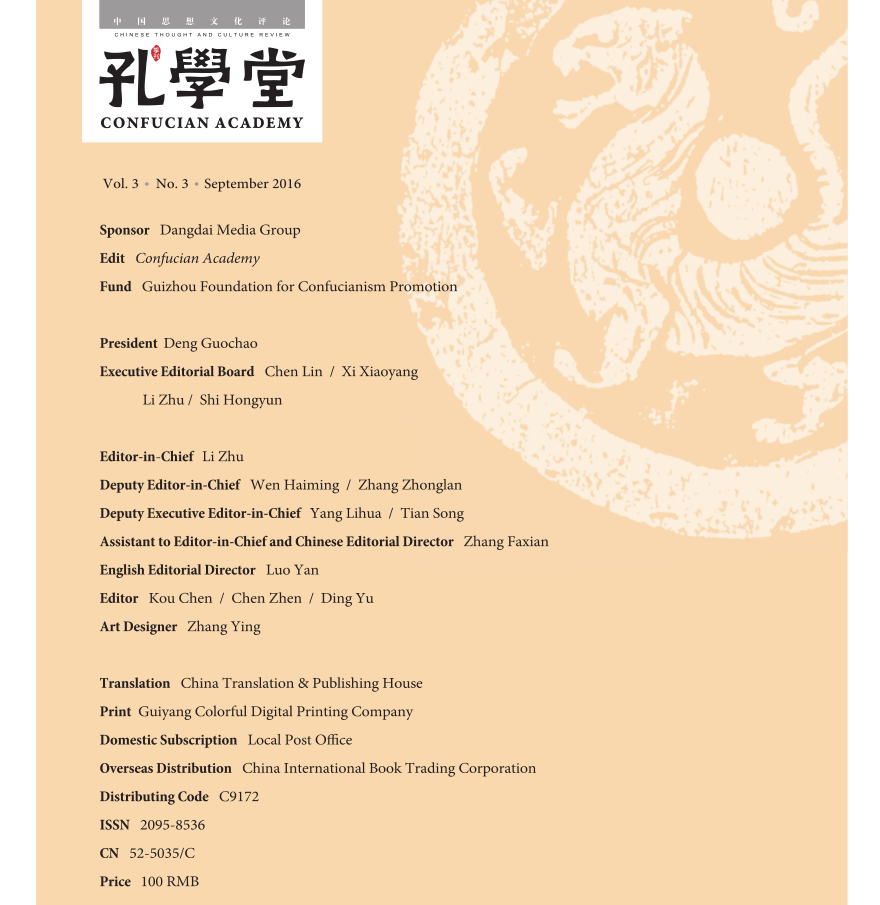


CONFUCIAN ACADEMY
Chinese Thought
and Culture Review
VOLUME 3 ·Number 3 ·September 2016
CONTENTS
Special Theme: Chinese Literature and Philosophies
4 Literature and Philosophies: Introduction to the Special Theme
Chen Xunwu
5 The Philosophical Discourse of Being: Confucianism, Daoism, and Buddhism in A Dream of Red Mansions
Chen Xunwu
21 White Deer Plain, White Deer Plain, Confucian Culture, and the Guanzhong School
Han Xing
35 Confucianism and Emotional Venting in Ming–Qing Novels:With the Cases of Heroes of the Marsh and Its Critiques
Li Mengyuan
Yangming Culture
43 The Original Meaning and the Orientation of Wang Yangming’s ‘Unity of Knowledge and Action’
Ding Weixiang
Overseas Confucian Studies
52 Modern Japanese Business Ethics: Absorption and Sublation of Confucian Thought
Liu Jincai
Studies of Pre-Qin Philosophers
61 Fate and Human Effort from the Perspective of Mozi’s Anti-Fatalism
Yang Wujin
69 Zengzi’s Intellectual Contributions to the Development of Confucianism
Huang Quanyan
Academic Forum
72 Family Values in Confucianism and Its Application to Modern Enterprise
Li Honglei
86 Modern Development of the Confucian Notion of Intuitive Knowledge
Lu Chang
97 Mou Zongsan’s Philosophical Aesthetic Discourse
Tang Sheng
Masters of Chinese Studies
99 Liu Xianxin’s Philosophy of Connecting and Combining Confucian and Daoist Ideas
Chen Zhong
Main articles Abstract
The Philosophical Discourse of Being: Confucianism,
Daoism, and Buddhism in A Dream of Red Mansions
Abstract: This essay offers a philosophical reading of the Chinese literary masterpiece A Dream of Red Mansions, which is a classic of both literature and philosophy. The philosophy of the novel captures the essential wisdom of traditional Chinese philosophies and illustrates the universality of the philosophical truths of humanity. The novel expounds a monumental phenomenology of humanity, and its philosophical questions, insights, profound vision and horizon of humanity constitute a universal paradigm for studying humanity and human existence.
Keywords: fate, authenticity, poetic existence, extremity producing self-destruction, enlightenment
Chen Xunwu, Ph.D., is professor of Philosophy of the Department of Philosophy & Classics at The University of Texas at San Antonio, San Antonio, TX 78249, USA.
White Deer Plain, White Deer Plain, Confucian Culture, and the Guanzhong School
Abstract: The cultural connotations of White Deer Plain include the image of the white deer and the tradition, customs, psychology, modes of existence, and thinking patterns of the local people. The novel White Deer Plain is based on the geographical coordinates of White Deer Plain and integrates history with reality, truth with imagination, and thought with emotion while deriving its core values from Confucian culture. Confucian culture is oriented toward humanity and focuses on benevolence as its core value, which is mainly manifested by learning to be humane. In White Deer Plain, Mr. Zhu embodies the spirit of Confucian culture, and Bai Jiaxuan is the practitioner of this culture. The novel, as a living specimen of the Guanzhong School of Confucianism, exhibits the charm of its integrity. White Deer Plain is the representative work of contemporary root-seeking literature under the influence of cultural self-reflection and the return of traditional culture. It attempts to establish the values for constructing the Chinese spiritual home.
Keywords: White Deer Plain, White Deer Plain, Confucian culture, Guanzhong School, root-seeking literature
Han Xing is professor and doctoral supervisor in the School of Chinese Classics at Renmin University of China.
Confucianism and Emotional Venting in Ming–Qing
Novels: With the Cases of Heroes of the Marsh and Its Critiques
Abstract: Emotional venting is a key concept and a literary instrument that mirrors the Confucian approach to social critiques in Ming–Qing novels. The vented emotions include the dissatisfaction with society, concerns on female issues, reflections on human existence, investigation of human relations, retrospection on destiny, and hatred of falsehood and hypocrisy. These themes are of great value to contemporary society.
Keywords: Ming–Qing novels, critiques, Heroes of the Marsh, emotional venting
Li Mengyuan is a doctoral candidate in Chinese Language and Literature at Fudan University.
The Original Meaning and the Orientation of
Wang Yangming’s ‘Unity of Knowledge and Action’
Abstract: Wang Yangming’s doctrine of “the unity of knowledge and action” used to be regarded as an isolated proposition, and there have been various interpretations of it from the perspectives of morality, subjectivity and objectivity, and moral practice. However, if examined along with the development of Wang’s philosophy, the doctrine points to holistic realization (characterized by acting with understanding and examination) and lies in self-restraint and sincerity. It is on this basis that Wang Yangming proposes that knowledge and action cannot be separated, but are unified in the same effort. On the other hand, because Wang uses conventional conceptions of knowledge and action to expound on self-restraint and sincerity, these ideas might be misunderstood or fail to play a positive role.
Keywords: Wang Yangming, unity of knowledge and action, original meaning, orientation
Ding Weixiang is professor and doctoral supervisor of the Department of Philosophy at Shaanxi Normal University.
Modern Japanese Business Ethics: Absorption
and Sublation of Confucian Thought
Abstract: In the history of Japanese social development and ethics, the formation of modern business ethics and its contribution to Japanese capitalist modernization benefited from its absorption and ingenuous adaptation of Confucian thought in modern chonin (businessman) ethics. Such critical sublation mediated and enabled the establishment of modern ethical values and laid the foundation for modern Japanese capitalist business ethics as represented by Shibusawa Eiichi’s theory of “Analects plus abacus.”
Keywords: business ethics, Confucian thought, “Analects plus abacus,” modernization
Liu Jincai is professor and doctoral supervisor in the Department of Japanese Language and Culture at Peking University, and distinguished visiting professor at Guizhou Normal University.
Fate and Human Effort from the Perspective of Mozi’s Anti-Fatalism
Abstract: Mozi’s ideas of anti-fatalism and respect for human effort are still of great value in today’s society. This paper analyses his anti-fatalism, his methods and reasons for it, and points out the rationality and disadvantage of his ideas. Besides, the author of this paper studies the dialectical relationship between fate and human effort, and concludes that human beings can make full use of their subjective initiative on the basis of their respect for objective laws.
Keywords: anti-fatalism, fate, respect for human effort, principle of avoidance of one-sidedness
Yang Wujin is professor and doctoral supervisor of the School of Philosophy at Renmin University of China.
Zengzi’s Intellectual Contributions to the Development of Confucianism
Detailed Abstract: In traditional Chinese culture, Zengzi (Zeng Shen曾参) was always a symbol of filial piety. He thus exerted a far-reaching influence on the Chinese culture of filiality. That being said, the essence of Zengzi’s concept of filiality is in people’s internal cultivation, not in some superficial pretension. He claimed, “When people take great care of seeing off the deceased and sedulously maintain memory of the distant ancestors, they will sincerely return to Virtue.” (Analects, 1:9) Zeng’s concept of piety differs fundamentally from the idea of pure filiality proposed by his disciple Yuezheng Zichun乐正子春. Furthermore, Zeng’s thought is more than a concept of filiality. After Confucius’s death, his disciples were scattered all over the country. Contrary to them, Zengzi chose to live in Lu, Confucius’s birthplace and unswervingly adhered to the Confucian orthodoxy. He spent much time and energy in tutoring disciples. Zengzi lived longer and taught brilliant students including Yuezheng Zichun and Zisi子思(483–402 BC). Mencius studied with Zisi and developed Confucianism further. Zengzi’s great endeavor in following Confucian tradition, laying the foundation for future, reviving what had been extinguished, and restoring what had been broken set a paradigmatic example of what Zhang Zai’s张载(1020–1077) dubbed as “preserving the learning of past sages,” and profoundly influenced the growth of Chinese culture. Unfortunately, people in China today recognize Zengzi merely as a symbol of the fullest filiality or a leading figure of the intellectual school advocating the administration through filiality. Therefore, it is necessary to clarify Zengzi’s intellectual contributions to the development of Confucianism.
Keywords: Zengzi, great virtue, great filiality, great bravery
Huang Quanyan is Doctor of Literature, professor of the School of Literature at Neijiang Normal University.
Family Values in Confucianism and Its Application to Modern Enterprise
Abstract: Confucianism views family as the basis that underlies the organization of society, in which intimate interpersonal relationships are established to satisfy member’s economic and psychological needs and emphasize the role of family in organizational learning and ethical education. Such a view is highly instructive to enterprises in modern society. Currently, the quasi-family concept, which reduces the boundaries between family and society, may act as a reference for developing organizational theories of contemporary enterprises through integration between economic and psychological contracts, as well as efficiency and emotional logic.
Keywords: family values in Confucianism, organizational forms of enterprises, family mode, quasi-family mode, economic contract, psychological contract, efficiency logic, emotional logic
Li Honglei is professor and doctoral supervisor of the Department of Philosophy at Sun Yat-sen University, and Vice-President of Chinese Confucian Academy.
Modern Development of the ConfucianNotion of Intuitive Knowledge
Abstract: The Confucian notion of intuitive knowledge has rich philosophical significance with regard to knowledge, emotions, and intent. It also plays an important role in the modernization of Confucianism. The ideas of morality, knowledge, intuition, and intellect involved are valuable resources for New Confucianism in its effort to rejuvenate traditional Confucian thought. There are three new approaches to intuitive knowledge: the intuitionalist approach of Liang Shuming, the positivistic approach of Feng Youlan, and the self-negation approach of Xiong Shili and Mou Zongsan. The three approaches have laid the foundation for the modern development of the theory of intuitive knowledge.
Keywords: intuitive knowledge, modern development, New Confucianism, intuition, morality and knowledge
Lu Chang, PhD, is Lecturer of the School of Education and Public Administration at Suzhou University of Science and Technology.
Mou Zongsan’s Philosophical Aesthetic Discourse
Detailed Abstract: Mou Zongsan’s (1909–1995) philosophy consists of three basic tenets: (1) the ontology of two-level existence (2) the system of summum bonum and perfect teaching, and (3) the concepts of discriminating discourse and unifying discourse of the true, the beautiful, and the good.
Taking the Tiantai Buddhist doctrine of perfect teaching as his paradigm, Mou not only analyzes the highest problem in Kantian philosophy, that of the perfect good, but also compares Kant’s solution to those in traditional Chinese wisdoms, claiming follows: humans are both finite and infinite; humans not only have intellectual intuition, but through praxis and effort, can manifest the kind of intellectual intuition akin to that of a sage, a Buddha, or a divine person, entering into the supreme, perfect spiritual state. This state is itself the most wonderful state that can be designated as the supreme aesthetic condition. Thus the question of the freedom of a sage is also central of Mou’s aesthetics.
Keywords: Mou Zongsan, aesthetics, modernity, aesthetic modernity, truth, beauty, and good
Dr. Tang Sheng is associate professor of the Institute of Literature and Media at Lingnan Normal University.
Liu Xianxin’s Philosophy of Connecting and Combining Confucianand Daoist Ideas
Abstract: Liu Xianxin was a renowned scholar who possessed both a profound traditional learning and spirit of intellectual innovation during the final years of the Qing dynasty and the early period of the Republic of China. He spent his entire life expounding his family teachings in traditional philosophy. As he espoused Chinese Daoism, Liu advocated connecting the principles of Confucianism and Daoism to establish a solid foundation for Chinese spiritual faith and culture. He sought to reestablish generative cosmology and to find a harmony among all philosophical schools of thought in China, even among all human cultures. Today, as we aspire to revitalize traditional Chinese values by tracing their philosophical and cultural sources, Liu Xianxin’s philosophical approach of connecting and combining Confucian and Daoist ideas should not be underestimated in terms of its significance for both academic and applied contexts.
Keywords: Liu Xianxin, family legacy, combining Confucian and Daoist ideas, faith in the Way of Heaven
Chen Zhong, PhD, is an associate professor of the School of Marxism at Guizhou University.
